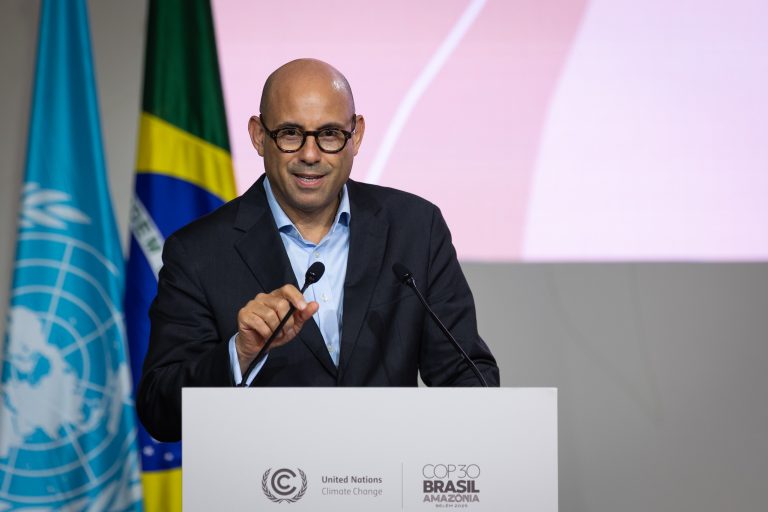Jakarta — The UN climate summit in Belém, Brazil, closed Saturday, November 22, with a clear message from UN Climate Chief Simon Stiell: despite geopolitical tensions, economic pressures, and the absence of the U.S. administration from the talks, global climate cooperation remains “alive and kicking.”
Stiell told delegates. “I’m not saying we’re winning the climate fight. But we are undeniably still in it, and we are fighting back.” He emphasised the unity of 194 countries, reaffirming confidence in the Paris Agreement and its continued progression toward a low-carbon future.
For the first time, countries collectively declared that “the global transition to low greenhouse gas emissions and climate-resilience is irreversible and the trend of the future,” a statement Stiell described as a pivotal political and market signal.
He highlighted several tangible outcomes of COP30, including a new agreement on just transition to ensure equitable economic transformation; a commitment to triple adaptation finance by 2035; and the expansion of real-economy initiatives under the COP Action Agenda, from restoring forests to expanding clean grids.
“These achievements are not a side-show – they are real-world progress on the things billions of people care about most,” Stiell said.
UNEP: Paris Agreement “still working”
UNEP Executive Director Inger Andersen also struck a cautiously optimistic note, acknowledging both setbacks and advancements at COP30.
“The talks in Belém have shown that the Paris Agreement is working and delivering results,” she said. But she warned: “We must do much more, move much faster, and stretch our collective ambition even further. Countries should see their new national climate plans as a baseline to build on, not a ceiling for ambition.”
Andersen pointed to strengthened action to halt deforestation — noting, for example, the Tropical Forest Forever Facility now at USD6.7 billion — and the surge of bottom-up climate leadership from Indigenous organisations, cities, companies, farmers, women’s networks and youth.
“UNEP will continue our work to support all partners deliver the promise of the Paris Agreement, for people and for planet,” she said.
Robinson: “The rising power of the determined”
Mary Robinson — former President of Ireland and Chair of The Elders — praised the collaborative spirit of COP30 while condemning persistent gaps in ambition.
“This deal isn’t perfect and is far from what science requires. But at a time when multilateralism is being tested, it is significant that countries continue to move forward together,” she said.
She noted disappointing failures on fossil fuel phase-out and deforestation, but highlighted the establishment of just transition guidelines and broader civic momentum beyond official negotiating rooms.
“If Belém revealed the limits of the possible, it also revealed the rising power of the determined,” Robinson said. “We must follow where that determination leads.”
Civil Society: “Promises, but still no plan”
Civil-society observers and climate-justice activists expressed a sharper critique of the summit’s final outcome: more words, more declarations — but still inadequate delivery.
At COP30, “the world received another set of new words and promises, but still no plan to deliver on what science demands and what communities need,” one statement from a climate-justice coalition said.
Campaigners acknowledged some progress — including the creation of the Belém Action Mechanism (BAM) with stronger safeguards for Indigenous rights — but emphasised that without a dated global fossil-fuel phase-out plan, the world remains off-track. Financing for adaptation remained vague, long delayed, and insufficient, prompting accusations that wealthy countries continue to stall while those on the front lines suffer.
Ilan Zugman, Director for Latin America and the Caribbean at 350.org, said:
“Real climate action means ending fossil fuels and delivering the finance figure that communities need to survive. The lack of concrete commitments in the final text of COP30 shows us who is still benefiting from the delay: the fossil fuel industry and the ultra-rich, not those living the climate crisis every day.”
From the Pacific, where climate impacts are existential, the criticism was even more stark.
“With the Belem Action Mechanism, we’re seeing progress. But without a transition away from fossil fuels, we’re stagnating at a time when our islands can’t afford even a small amount of delay,” said Fenton Lutunatabua, Pacific Team Lead at 350.org.
Civil-society movements said that the strongest climate momentum at COP30 did not come from formal drafts — but from a near-global public consensus that fossil fuels must go. Youth, Indigenous leaders, faith groups, workers and farmers demanded climate justice in Belém’s streets, calling for a rapid timeline for phasing out oil, gas and coal.
A COP of implementation
The COP30 Global Climate Action Agenda delivered widespread sectoral transformation efforts, including: USD1 trillion committed to expand clean power grids; hundreds of millions of hectares protected or restored; more than 12 million farmers shifting to regenerative agricultural systems; 437.7 million people strengthened in climate resilience; and trillions of dollars now being repositioned from carbon-intensive industries to climate-aligned investment.
Stiell closed with a challenge: climate must stay on the agenda, not for two weeks of negotiation each year, but for all 52 weeks that follow. “With or without Navigation Aids, our direction is clear: the shift from fossil fuels to renewables and resilience is unstoppable,” he said.
“We need to carry on this spirit of mutirão — the collective effort — that has won out here at COP30.” (nsh)
Banner photo: UN Climate Chief Simon Stiell closing the COP30 in Belem, Brazil. November 22, 2025. Source: UN Climate/Kiara Worth















